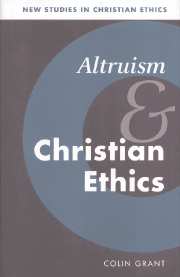6 - Collegial altruism
Published online by Cambridge University Press: 22 September 2009
Summary
Thomas Nagel's Kantian exploration of the prospects for altruism in The Possibility of Altruism, has its counterpart in a description and promotion of a more immediate version of altruism by Lawrence Blum in Friendship, Altruism and Morality. “Impartiality, fairness, and justice are personal virtues, but they are merely some virtues among others,” Blum contends. “They are not definitive of moral virtue altogether.” To equate these qualities with moral virtue is to see morality in abstract terms. This overlooks two central dimensions of morality in particular. It does not consider the actual situation in which the moral agent operates, and so is deficient in accounting for motivation for moral action in general, and for altruism in particular. Moral issues emerge not by standing back and reflecting on reality in impersonal terms, but through claims that are made on us directly by people to whom we are connected and with whom we come into contact. Failure to consider the moral agent's real situation points to the other basic defect in the rational approach to altruism, the neglect of the emotions. “Our feelings and emotions are as much a part of our moral self as are the actions we perform and the moral views to which we give assent.” Rational deliberation, on its own, is not only ungrounded in human life, but also unmotivated for human beings. As well as being rational beings, we are also constituted by emotions and the attachments that trigger these.
- Type
- Chapter
- Information
- Altruism and Christian Ethics , pp. 135 - 164Publisher: Cambridge University PressPrint publication year: 2000

